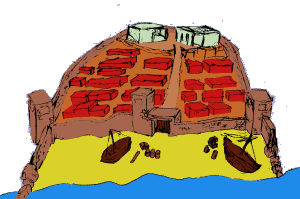


| |
Through the centuries, many versions of Dido's story have been written. Her story has been used to show women how to behave and how definitely not to behave.
The oldest sources of Dido illustrate the Dido we today call the historical Dido. It is assumed that they show her life most accurately.
 The historical Dido tricked her tyrannic brother after he had killed her husband,
so she could flee with boats
full of riches. After she had bought
some land from an African King, she founded Carthage which flourished very
well. The king who had sold her the land in the first place, wanted to get
a piece of her success and threatened to declare war against the young city
if Dido wouldn't marry him. She, however, had no intention of marrying again and
losing her independance, so she committed suicide. The Carthagians were
very impressed by this noble deed, and honored her as a goddess afterwards.
The historical Dido tricked her tyrannic brother after he had killed her husband,
so she could flee with boats
full of riches. After she had bought
some land from an African King, she founded Carthage which flourished very
well. The king who had sold her the land in the first place, wanted to get
a piece of her success and threatened to declare war against the young city
if Dido wouldn't marry him. She, however, had no intention of marrying again and
losing her independance, so she committed suicide. The Carthagians were
very impressed by this noble deed, and honored her as a goddess afterwards.
The story of the historical Dido was used in the middle ages to show that an honorable widow shouldn't marry again.
Almost a millenium after the death of the historical Dido, the writer Vergil decided to rewrite her story. Vergil's version was very successful and is still pretty well known today. Over centuries people learned Latin with Vergil's books, and the Vergilian Dido has even been adapted for an opera.
Like the historical Dido, Vergil's Dido fled from her brother and founded Carthage after buying some land in Africa. As the gods would have it, Aeneas, a great hero who had fled from the burning Troy, stranded near Carthage not much later. Dido fell madly in love with the hero (here Amor played his part) and completely forgot to take care of her people. The gods, however, still had plans for Aeneas to found Rome, so he had to leave. Dido then killed herself because she had not only failed to rule over her people, but she hadn't even been able to keep a man there who could have taken over that job.
In our version, Dido is probably saved from her suicidal death for the first time. Also, the king could show himself from his good side. Instead of being jealous of Dido's success, he turns history around and founds the first university where women have free acess to study. And this was 2700 years before women first were admitted to universities with equal rights.
